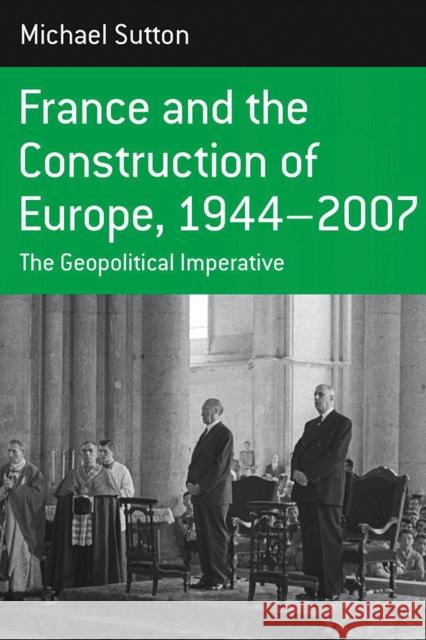France and the Construction of Europe, 1944-2007: The Geopolitical Imperative » książka
France and the Construction of Europe, 1944-2007: The Geopolitical Imperative
ISBN-13: 9780857452900 / Angielski / Miękka / 2011 / 366 str.
France and the Construction of Europe, 1944-2007: The Geopolitical Imperative
ISBN-13: 9780857452900 / Angielski / Miękka / 2011 / 366 str.
(netto: 148,12 VAT: 5%)
Najniższa cena z 30 dni: 140,79
ok. 30 dni roboczych
Bez gwarancji dostawy przed świętami
Darmowa dostawa!
"The book is highly impressive in its range, integrating such issues as the impact of the Cuban missile crisis into its account of Franco-American relations and the implications for France's position in Europe. It is also impressive in its command of intricate detail in the technical, economic sphere and in high-level negotiations, as well as in behind-the-scenes maneuvers taking place in parallel to more overt diplomacy." - French Studies "Sutton's important work has the merit of making known a whole range of French historiography that, because of not being available in English translation, is not accessible to scholars who do not read French. At the same time, he brings together, in an original manner, the main results of historical research on the role of France in Europe, a theme that is of vital importance still today." - Modern & Contemporary France " The author] has written an excellent chronicle of the central episodes of European construction, from the invention of the ECSC to the Maastricht Treaty and beyond, keeping French initiatives, breakthroughs, and missteps clearly in view. He has also made the more recondite economic complexities of the story intelligible to general readers. As a result, Sutton has produced an important overview of European integration that highlights the influence French leaders exerted in building what by the 1990s had become the fundamental structures of the European Union we know today." - H-France "Sutton has a feel both for the ongoing manoeuvres of the main protagonists and for the continuities of the broad picture. He keeps the context constantly in geopolitical focus, drawing upon a wide range of reliable secondary sources. His] scrupulous study will allow both protagonists and antagonists to recognize why the European show is still on the road, but now arouses fears rather than hopes." - European History Quarterly ."an excellent overall view." - Georges-Henri Soutou In the second half of the twentieth century France played the greatest role - even greater than Germany's - in shaping what eventually became the European Union. By the early twenty-first century, however, in a hugely transformed Europe, this era had patently come to an end. This comprehensive history shows how France coupled the pursuit of power and the furtherance of European integration over a sixty-year period, from the close of the Second World War to the hesitation caused by the French electorate's referendum rejection of the European Union's constitutional treaty in 2005. Michael Sutton is Professor Emeritus, Modern History and International Relations, at Aston University. He has written regularly on France for The Economist Intelligence Unit - part of The Economist newspaper group - since 1985, and worked in Brussels from 1973 to 1993 monitoring European Community developments. He is also a specialist in twentieth-century French political thought and philosophy.
"The book is highly impressive in its range, integrating such issues as the impact of the Cuban missile crisis into its account of Franco-American relations and the implications for Frances position in Europe. It is also impressive in its command of intricate detail in the technical, economic sphere and in high-level negotiations, as well as in behind-the-scenes maneuvers taking place in parallel to more overt diplomacy." · French Studies"Suttons important work has the merit of making known a whole range of French historiography that, because of not being available in English translation, is not accessible to scholars who do not read French. At the same time, he brings together, in an original manner, the main results of historical research on the role of France in Europe, a theme that is of vital importance still today." · Modern & Contemporary France"[The author] has written an excellent chronicle of the central episodes of European construction, from the invention of the ECSC to the Maastricht Treaty and beyond, keeping French initiatives, breakthroughs, and missteps clearly in view. He has also made the more recondite economic complexities of the story intelligible to general readers. As a result, Sutton has produced an important overview of European integration that highlights the influence French leaders exerted in building what by the 1990s had become the fundamental structures of the European Union we know today." · H-France"Sutton has a feel both for the ongoing manoeuvres of the main protagonists and for the continuities of the broad picture. He keeps the context constantly in geopolitical focus, drawing upon a wide range of reliable secondary sources. [His] scrupulous study will allow both protagonists and antagonists to recognize why the European show is still on the road, but now arouses fears rather than hopes." · European History Quarterly".an excellent overall view." · Georges-Henri SoutouIn the second half of the twentieth century France played the greatest role - even greater than Germanys - in shaping what eventually became the European Union. By the early twenty-first century, however, in a hugely transformed Europe, this era had patently come to an end. This comprehensive history shows how France coupled the pursuit of power and the furtherance of European integration over a sixty-year period, from the close of the Second World War to the hesitation caused by the French electorates referendum rejection of the European Unions constitutional treaty in 2005.Michael Sutton is Professor Emeritus, Modern History and International Relations, at Aston University. He has written regularly on France for The Economist Intelligence Unit - part of The Economist newspaper group - since 1985, and worked in Brussels from 1973 to 1993 monitoring European Community developments. He is also a specialist in twentieth-century French political thought and philosophy.











